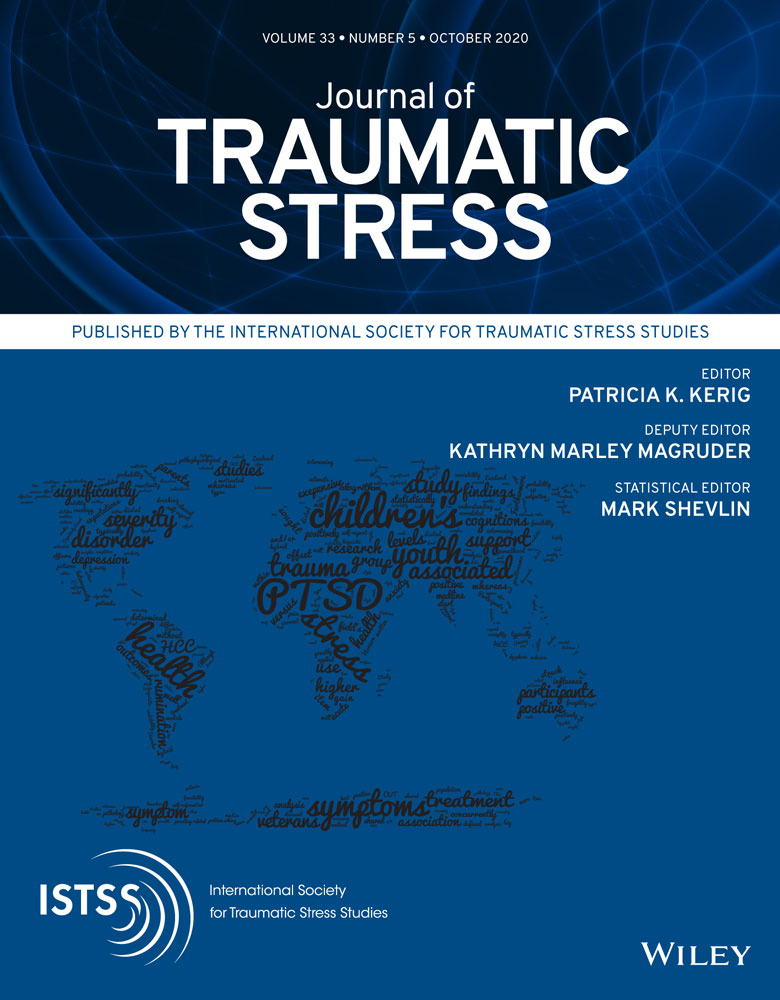Features of Childhood Maltreatment and Resilience Capacity in Adulthood: Results from a Large Community-Based Sample
This work was supported by the National Institute of Mental Health within the National Institutes of Health (K01MH102403, R01MH113930 [Dunn]; MH102890 [Powers]; T32MH017119 [Choi and Nishimi]). The content is solely the responsibility of the authors and does not necessarily represent the official views of the National Institutes of Health. Additionally, the contents of this report do not represent the views of the Department of Veterans Affairs or the United States Government.
Abstract
enChildhood maltreatment is consistently associated with poor outcomes. However, few epidemiological studies have examined the association between childhood maltreatment and adult resilience capacity, defined as one's perceived ability to cope successfully with challenges. This study aimed to determine associations between adult resilience capacity and specific types and features of childhood maltreatment. Participants were African American adults recruited from a public urban hospital in Atlanta, GA (N = 1,962) between 2005 and 2013. Childhood maltreatment, including witnessing domestic violence or physical, emotional, and sexual abuse, was assessed retrospectively using the Traumatic Events Inventory. Perceived resilience capacity was assessed using the Connor-Davidson Resilience Scale. Linear regressions were performed assessing the association between resilience capacity and childhood maltreatment exposure in general, as well as specific dimensions of exposure, including type, co-occurrence, and developmental timing, adjusting for covariates. Participants exposed to any maltreatment reported lower resilience capacity than unexposed peers, B = −0.38, SE = 0.04, p < .001. All maltreatment types were negatively associated with resilience capacity, even after adjusting for other lifetime trauma exposure. Only emotional abuse remained significantly associated with resilience capacity after accounting for current psychological distress, B = −0.11, SE = 0.05, p = .022. Maltreatment co-occurrence followed an inverse dose–response relationship with resilience capacity: For each additional maltreatment type, scores decreased by 0.18 units (SD = 0.02), p < .001. Finally, the developmental timing of maltreatment did not reveal any differential influences on resilience capacity. The results suggest that childhood emotional abuse and co-occurrence of maltreatment types may be particularly deleterious to adult resilience capacity.
Resumen
esSpanish Abstracts by Asociación Chilena de Estrés Traumático (ACET)
Características del maltrato infantil y la capacidad de resiliencia en adultez: Resultados de una gran muestra comunitaria
MALTRATO INFANTIL Y CAPACIDAD DE RESILIENCIA DE ADULTOS
El maltrato infantil se asocia constantemente con malos resultados. Sin embargo, pocos estudios epidemiológicos han examinado la asociación entre el maltrato infantil y la capacidad de resiliencia de los adultos, definida como la capacidad percibida de uno mismo para afrontar con éxito los desafíos. Este estudio tuvo como objetivo determinar asociaciones entre la capacidad de resiliencia de los adultos y tipos y características específicas del maltrato infantil. Los participantes fueron adultos afroamericanos reclutados de un hospital público urbano en Atlanta, GA (N = 1.962) entre 2005 y 2013. El maltrato infantil, incluido el presenciar violencia doméstica o abuso físico, emocional y sexual, se evaluó retrospectivamente mediante el Inventario de Eventos Traumáticos. La capacidad de resiliencia percibida se evaluó mediante la escala de resiliencia de Connor-Davidson. Se realizaron regresiones lineales para evaluar la asociación entre la capacidad de resiliencia y la exposición al maltrato infantil en dimensiones generales y específicas de la exposición, incluido el tipo, la co-ocurrencia y el tiempo de su desarrollo, ajustando por covariables. Los participantes expuestos a cualquier maltrato reportaron menor capacidad de resiliencia que sus pares no expuestos, B = -0.38, DE = 0.04, p <.001. Todos los tipos de maltrato se asociaron negativamente con la capacidad de resiliencia, incluso después de ajustar por otra exposición a traumas en sus vidas. Solo el abuso emocional permaneció significativamente asociado con la capacidad de resiliencia después de tener en cuenta la angustia psicológica actual, B = -0.11, DE = 0.05, p = .022. La co-ocurrencia de maltrato siguió una relación inversa de dosis-respuesta con la capacidad de resiliencia: Para cada tipo de maltrato adicional, las puntuaciones disminuyeron en 0.18 unidades (DE = 0.02), p < .001. Finalmente, el momento del desarrollo en que ocurrió el maltrato no reveló ninguna influencia diferencial sobre la capacidad de resiliencia. Los resultados sugieren que el abuso emocional infantil y la co-ocurrencia de tipos de maltrato pueden ser particularmente perjudiciales para la capacidad de resiliencia de los adultos.
抽象
zh簡體及繁體中文撮要由亞洲創傷心理研究學會翻譯
JOTS-18-0412.R3 Nishimi
Features of childhood maltreatment and resilient capacity in adulthood: Results from a large, community-based sample
Traditional Chinese
標題: 童年受虐經歷的特徵與成年後的恢復力:從大型及社區為本的樣本中取得的結果
撮要: 童年受虐常與不良心理狀況有關。然而, 目前只有少量流行病學研究, 檢視童年受虐跟成年的恢復力(resilience capacity) 之間的關連。恢復力即個人感知自己成功應對挑戰的能力。本研究旨在找出成年的恢復力跟特殊類型及特徵的童年受虐經歷之間的關連。我們從2005年至2013年間, 於佐治亞州阿特蘭大一間城市公營醫院招募非裔美國成人作為樣本(N = 1,962)。我們以創傷事件量表, 追溯評估樣本的童年受虐經歷, 包括目睹家庭暴力或肢體、情緒、性虐待。我們以Connor—Davidson恢復力量表, 評估樣本的恢復力感知。線性迴歸分析用以評估恢復力與童年受虐之間的關連, 包括普遍的童年受虐經歷, 及特殊的經歷, 包括不同類型經歷、其同時性及發展時間, 並對共變量作調節。曾經歷任何類型的虐待的樣本, 相比無受虐經歷的樣本, 其恢復力都較低 (B = −0.38, SE = 0.04, p < .001) 。所有類型的童年受虐經歷都跟恢復力有負向關連, 即使對其他終生的創傷經歷作調節後亦如是。在解釋了當前的心理悲痛後, 只有情緒虐待跟恢復力仍有顯著關連 (B = −0.11, SE = 0.05, p = .022) 。同時經歷多於一種虐待, 跟恢復力有逆向的藥物劑量反應關係:每經歷多一種虐待, 分數就減少0.18 個單位(SD = 0.02) (p < .001) 。最後, 虐待的發展時間並無對恢復力產生任何可識別的影響。結果反映, 童年的情緒虐待及同時經歷多種虐待, 可能對成人的恢復力尤其有害。
Simplified Chinese
标题: 童年受虐经历的特征与成年后的恢复力:从大型及小区为本的样本中取得的结果
撮要: 童年受虐常与不良心理状况有关。然而, 目前只有少量流行病学研究, 检视童年受虐跟成年的恢复力(resilience capacity) 之间的关连。恢复力即个人感知自己成功应对挑战的能力。本研究旨在找出成年的恢复力跟特殊类型及特征的童年受虐经历之间的关连。我们从2005年至2013年间, 于佐治亚州阿特兰大一间城市公营医院招募非裔美国成人作为样本(N = 1,962)。我们以创伤事件量表, 追溯评估样本的童年受虐经历, 包括目睹家庭暴力或肢体、情绪、性虐待。我们以Connor—Davidson恢复力量表, 评估样本的恢复力感知。线性回归分析用以评估恢复力与童年受虐之间的关连, 包括普遍的童年受虐经历, 及特殊的经历, 包括不同类型经历、其同时性及发展时间, 并对共变量作调节。曾经历任何类型的虐待的样本, 相比无受虐经历的样本, 其恢复力都较低 (B = −0.38, SE = 0.04, p < .001) 。所有类型的童年受虐经历都跟恢复力有负向关连, 即使对其他终生的创伤经历作调节后亦如是。在解释了当前的心理悲痛后, 只有情绪虐待跟恢复力仍有显著关连 (B = −0.11, SE = 0.05, p = .022) 。同时经历多于一种虐待, 跟恢复力有逆向的药物剂量反应关系:每经历多一种虐待, 分数就减少0.18 个单位(SD = 0.02) (p < .001) 。最后, 虐待的发展时间并无对恢复力产生任何可识别的影响。结果反映, 童年的情绪虐待及同时经历多种虐待, 可能对成人的恢复力尤其有害。




